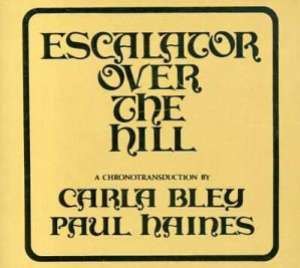 There are three albums on my list that I discovered because of great music writing. The first, Charlie Parker’s “Bird/The Savoy Recordings (Master Takes),” comes in at No. 14. Another will come later.
There are three albums on my list that I discovered because of great music writing. The first, Charlie Parker’s “Bird/The Savoy Recordings (Master Takes),” comes in at No. 14. Another will come later.
Today’s entry is “Escalator over the Hill,” a two-hour 1971 release written by Carla Bley and performed by her, the Jazz Composers Orchestra (which she co-founded) and a cast of stars. I discovered this remarkable album because of a review by Stephen Davis that appeared in either The Phoenix or Boston After Dark; I suspect it was the former, though I didn’t make a note of it on the clip that I kept. (For you alt-weekly trivia buffs, Boston After Dark became The Boston Phoenix, and The Phoenix became The Real Paper. It’s complicated.)
Davis describes “Escalator” as “a phantasmagoria of sound, imagination, and virtuousity,” and Bley’s writing as “a mingling of the immediacy of rock with the harmonic and thematic intelligence of jazz.” What music-obsessed 15-year-old could resist? Especially since you could order the three-record set, with notes, pictures and “a handsome gilt-letter box,” for just $12, not a lot of money even then.
“Escalator” was No. 5 in my Facebook list earlier this year. I’ve moved it down a bit. Great as it is, it’s just not the sort of thing I find myself listening to very often. It’s too big, too ambitious. The music comes at you relentlessly, in waves. How to describe it? A jazz-rock opera? (Or, rather, a jazz and rock opera; there is no jazz-rock on “Escalator,” thank you very much.) A “chronotransduction,” as Bley calls it?
I listened to “Escalator” in full this week for the first time in a few years. It doesn’t merely hold up. It sounds as fresh as it did when it was first released. The 13-minute “Hotel Overture” is as stunning a piece of music as I’ve heard, a gonzo big-band performance that ranges from a rather traditional opening to free jazz, anchored by Gato Barbieri’s screeching tenor sax.
And there’s so much more. Much of it is indescribable, but I should note that, among some of the finest jazz musicians of their era, we also get to hear Linda Ronstadt, nearly unknown at the time; Jack Bruce, a couple of years past Cream; and Viva, part of Andy Warhol’s entourage, who provides occasional narration with an utter emotional flatness will make you laugh.
A word about Bruce: He’s all over the album, and his singing and bass playing are among the highlights. Davis called “Escalator” “the zenith of Jack Bruce’s long and amazingly checkered career.” You could also say that Cream was not the best power trio Bruce ever played in; rather, it’s Jack’s Traveling Band on “Escalator,” in which he’s joined by Mahavishnu John McLaughlin on guitar and Paul Motian on drums (and Bley on organ). “Businessmen,” in particular, rocks so hard that there’s really no place else to go.
I could go on. But let me express my one reservation: Paul Haines’ maddeningly obtuse lyrics. Depending on my mood, I find them either hilariously inventive or hopelessly pompous and esoteric. The story is supposed to be about the weird characters who inhabit Cecil Clark’s hotel, set in Rawalpindi. But it really isn’t. Bruce and Ronstadt supposedly play the lead characters, David and Ginger — but that idea is haphazardly executed at best. Here’s a taste of Haines from “Detective Writer Daughter”:
Detective writer of English
She was once the queen of Sweden.
His father’s horse was something like a house
Dad was a German where they lived.
But never mind the lyrics, although you might love them. This is incredible music that stands up to repeated listenings — oom-pah music, Indian music, ominous noise, trumpeter Don Cherry’s atonal soloing, chanting.
I started with Stephen Davis. I’ll close with Marcello Carlin, who began a 2003 essay about “Escalator” with this: “So here I am, faced with the task of explaining and justifying to you the piece of music which I regard as the greatest ever made, the gold standard against which I qualitatively measure all other music, the definitive record which, 30 years after its original appearance, may still render all other records redundant.”
The greatest record ever. How can you resist? Oh, and did I mention that, for all its strangeness, “Escalator” is also surprisingly accessible? Set aside some time and give “Escalator over the Hill” a chance. Everything else is melancholy and industrial.
Talk about this post on Facebook.
Discover more from Media Nation
Subscribe to get the latest posts sent to your email.
